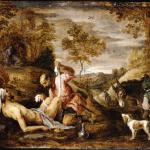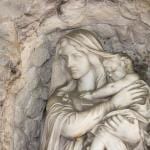
No one is self-made. No one establishes themselves in the world without the help of others. Society comes together with people doing different jobs, different tasks, and no one who claims to be self-made has achieved their success all by themselves. They might have done a few things well, but that is all; for everything else, they still rely upon others. How many people grow their own food? How many collect and purify all the water they drink? How many people build their own homes? How many people make their own clothes? How many build their own cars? How many make the roads they drive on? How many make the medicine they take? How many people cure their own illnesses? If we can’t do all these ourselves, we certainly are not self-made. We rely upon others – and yet, many people, ignoring all the help they get from others, think they build themselves up and do it all alone. Then, they tell us, if they can do it, we can and should do so as well. Any help, anything which they get from others is ignored, and by this, they reject their obligation to help fulfill the needs of others.
It is a delusional ideology which prompts the notion of the self-made person. It is a form of Satanic pride – for only by being a god all by ourselves can someone truly be self-made. Only those who generate themselves, give themselves their own birth, and make for themselves all they want through their own power can truly be self-made. Since no one can truly do this, no one is self-made; those who suggest we should be self-made, therefore, end up harming everyone through their unsustainable delusion.
The prophetess Hannah, realizing this, declares in her prayer the greatness of the Lord and how no is able to do all things by their own might alone:
Talk no more so very proudly, let not arrogance come from your mouth; for the LORD is a God of knowledge, and by him actions are weighed. The bows of the mighty are broken, but the feeble gird on strength. Those who were full have hired themselves out for bread, but those who were hungry have ceased to hunger. The barren has borne seven, but she who has many children is forlorn. The LORD kills and brings to life; he brings down to Sheol and raises up. The LORD makes poor and makes rich; he brings low, he also exalts. He raises up the poor from the dust; he lifts the needy from the ash heap, to make them sit with princes and inherit a seat of honor. For the pillars of the earth are the LORDS, and on them he has set the world. He will guard the feet of his faithful ones; but the wicked shall be cut off in darkness; for not by might shall a man prevail (1 Sam. 2:3-9 RSV).
The Venerable Bede, upon reading this passage, understood the point well. By ourselves, without God’s grace, our sins make us wicked, and because sin corrupts and destroys what it touches, without grace, we will be less than we were meant to be. Those who want to believe in their own strength and rely upon it alone will find themselves weak and powerless, but those who rely upon God will be able to achieve the full potentiality in their humanity and truly be human:
[2:9] ‘because no man shall prevail by his own strength’. This looks back to an earlier statement. Therefore, the wicked who trust in their own power and disdain to ask for God’s help, ought to keep silent in the darkness, that is, the damned should cease at least from the blind wickedness they are driven to, because whoever rightly wishes to be called ‘a man’ shall prevail not by his own strength but by the grace of his Creator. [1]
All those who like to think themselves as rugged individualists, as doing all things for themselves, do not attain any mastery of themselves as they let their pride and delusion get the best of them. The ideology which promotes the self-made person, the ideology of rugged individualism, is in reality a secular form of Pelagianism, for it suggests that we can do all things ourselves without the need of others, just as Pelagianism suggests we can do all that we need to do by ourselves in order to attain beatitude. The ideology is one and the same, just rendered into a different context. And just as Pelagian thought is a heresy, for it ignores grace, so secular Pelagianism, with its rugged individualism, ignores who and what a person is (a relational entity) and that we can only be all we can be in relation to others (and with God’s grace). No one can build themselves up all by themselves. The more we try to do so, the more we try to become, as it were, an island all by ourselves, the more we lose and less we become.
We must realize we are all in this together. We are stronger together. We are to help build each other up, supplementing each other, providing for each other what each other lacks. Anyone who thinks they build themselves up all by themselves ends up abusing others, for when they deny what others have done for them, ends up having them ignore the needs of others and letting them suffer and perish “because they did it to themselves.” How can any Christian follow such an ideology? How can anyone look to Jesus, ask him to save them, and then think they are self-made and others, likewise, must be self-made? Jesus warned us in his parables not to think like this:
Therefore the kingdom of heaven may be compared to a king who wished to settle accounts with his servants. When he began the reckoning, one was brought to him who owed him ten thousand talents; and as he could not pay, his lord ordered him to be sold, with his wife and children and all that he had, and payment to be made. So the servant fell on his knees, imploring him, `Lord, have patience with me, and I will pay you everything.’ And out of pity for him the lord of that servant released him and forgave him the debt. But that same servant, as he went out, came upon one of his fellow servants who owed him a hundred denarii; and seizing him by the throat he said, `Pay what you owe.’ So his fellow servant fell down and besought him, `Have patience with me, and I will pay you.’ He refused and went and put him in prison till he should pay the debt. When his fellow servants saw what had taken place, they were greatly distressed, and they went and reported to their lord all that had taken place. Then his lord summoned him and said to him, `You wicked servant! I forgave you all that debt because you besought me; and should not you have had mercy on your fellow servant, as I had mercy on you?’ And in anger his lord delivered him to the jailers, till he should pay all his debt. 35 So also my heavenly Father will do to every one of you, if you do not forgive your brother from your heart (Matt. 18:23-34 RSV).
The Christian who has had their sins forgiven, who has had grace given to them so they can become perfect, should realize that they are not self-made. And if they are not self-made, they should not expect others to be self-made. They should not place demands on others which they cannot fulfill themselves. If they received help, they likewise are expected to help others. Pelagian thought tells us we can be self-made, but our sins, our weaknesses, tell us otherwise; and once we realize we are not self-made, we should realize no one is. We must work together, helping each other, sharing the strengths we have with those who are weak and needy, realizing that in return, in our own weaknesses, in where we find ourselves deficient, we likewise will have help as well.
It is amazing that any Christian could think of themselves as a self-made person, and so demand others to be self-made. Do we realize what it means to be saved by Jesus Christ? Do we really acknowledge Jesus? The only thing which we have made for themselves is our own destruction. If we realize we can and do all things only through Jesus, we would not end up putting undo demands on others. We must realize that to be a Christian is to acknowledge that we are not self-made; we are made and then made new by Jesus. This is true for everyone. No one will be self-made, no matter how much some secular ideology suggests otherwise.
[1] Bede, On First Samuel. Trans. Scott DeGregorio and Rosalind Love (Liverpool: University of Liverpool Press, 2019), 130.
Stay in touch! Like A Little Bit of Nothing on Facebook.
If you liked what you read, please consider sharing it with your friends and family!













